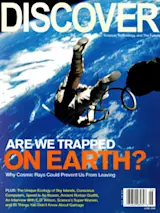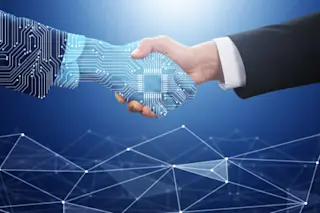DISCOVER asked David Bodanis—a former OxfordUniversity lecturer, trend consultant for BMW, author of E=mc^2: A Biography of the World's Most Famous Equation, and motormouth who talks at nearly the speed of light—to investigate the pace of innovation these days in America. He shared his conclusions in a series of missives to senior editor Corey S. Powell.
Dear Corey,
I just finished my research trip for you, hanging out with software developers and venture capitalists in Silicon Valley, and, boy, am I confused. Everyone here believes that technology is being introduced faster than ever. But in their private lives, hardly anything has changed in years.
The plane I flew in on, for example, was a Boeing 747. It's a great jet, but it was designed more than 30 years ago. There are more movies to watch on board than there used to be, but the basic idea—a metal tube attached to jet engines that burn modified petroleum, carrying a lot of people at around 600 mph—is much the same as it has been for all planes since then.
When I got out of the plane, I used a credit card to rent a car. Well, credit cards are almost half a century old, and although the computer systems behind them are faster than they once were, people have been using this basic technology for decades. The rental car itself was a lot like a car from two decades ago: It got similar mileage, had a similar internal combustion engine, and gave me a familiar driving experience. Clicking a few buttons on the dashboard led me to Motown tunes of 40 years ago. The process was a bit less efficient than putting in a tape, but not too much worse.
The news of the day was about plans for the next launch of the space shuttle, which at first glance seems a mark of high-tech modernity. But the shuttle was designed in the 1970s, using a great deal of 1960s technology. Its design was locked in around the time Ford introduced the Pinto.
It goes on and on. Oil rigs and nuclear missiles and microwave ovens and the New York Stock Exchange and international phone calls—all work more efficiently than in decades past, but they still feel much the same as they did many, many years ago.
This sense of stasis is actually kind of nice, because it means my young kids and I share a common experience. I saw Spielberg's E.T. when it first came out, and then saw it again recently with my children on its 20th-anniversary rerelease. There was little there to surprise them. The cars and fridges and bikes and almost everything else could easily have come from a movie set in 2006.
Technophiles tend to swoon over Apple products, like the spiffy new iMac I'm typing on, but even this machine illustrates the point. The graphic interface, with icons representing folders sitting on a simulated desktop, was developed at Xerox PARC—once again, in the 1970s. Aside from the embarrassing hairstyles and lapels, that sure seems to have been an important decade for innovation. The computer mouse was developed by Douglas Engelbart around the same time, as a modification of the control systems he used while operating 1940s-era radar oscilloscope screens.
Oops, gotta sign off. The kids have a new book about a boarding school (a topic common since the early 1800s, I believe) and wizards (common since medieval times), and I have to make some rota for how they divide their time with it.
Dear Corey,
Now that I'm settled back at home, I'll happily address some of your objections. You're right that I was taking cheap shots at the Macintosh interface, and yes, it's not really as old as some of its competition. My children are reading the latest installment of Harry Potter in the next room—and the book they are tearing through so eagerly is nothing more than hardened carbon granules pressed into shredded, stretched, and dried wood pulp. That technology certainly makes my iMac look new.
But seriously, you asked me to explain how innovation could possibly be slowing down, given all the money and attention given to high tech. I blame something I call the Greenspan effect.
The former Federal Reserve chairman Alan Greenspan is an astute economist, but no more astute than many others. Yet for 18 years, four different presidents didn't dare replace him (until he finally decided to retire), because it would have been like poking around inside a whirring engine. The U.S. economy is too important to interfere with while it's in motion.
So it is with our technology. America is changing so slowly compared with many countries in East Asia precisely because we have so much invested in our success this far. When a technology is central to our life, who's going to shut it down for uncertain, aiming-in-the-dark upgrades? Air traffic computers and software are often decades old: It's dangerous to bring in entirely fresh ones. The situation is much the same with PC software. Computer clock speed keeps increasing, but hardly anyone wants to accept the downtime that would result from having to learn fundamentally new programs. Browsers are similar to what they were a decade ago; spreadsheets are similar to those of two decades ago.
It gets worse, because the organizations that have been the most successful at developing new technologies aren't going to let go of their success easily. Microsoft CEO Steve Ballmer is an energetic guy, but if I work for him and have an idea for a stunningly new product that will undercut something the company is already selling, I will learn that his energy extends to protecting his home turf. My brilliant idea is not going to get approved.
That wouldn't matter if our top firms were stodgy and closed to outsiders, as much of American industry was until the last few decades of the 20th century. Now they're open to talent, blessedly independent of gender or skin color—yet the reflex of keeping bright hires from cannibalizing established firms hasn't changed.
The result is that our big, open-to-talent corporations are wondrous machines for scooping up the top talent from around the country, indeed from around the world, and then ensuring that they never again contribute anything fundamentally new. Merely producing pharmaceutical drugs that are me-too copies of what's already on offer (or titanium golf clubs designed to provide some slight edge on the greens) is not exactly what made America great.
Patents are supposed to foster innovation, but lately they've gotten out of hand. With the government allowing patents for such broad concepts as one-click shopping, new firms increasingly have to push through a sludge of added legal costs, paying royalties for what in the past would have been openly available for everyone to use.
The problem is especially bad in medical research. Many common procedures, like certain tests central to breast cancer research, have recently been patented, even though a previous generation of researchers would have considered that outrageous. A good many smaller labs, where some of the most innovative ideas traditionally arise, can't afford to stay in the research game.
Even if someone pushes an idea past gatekeepers like Steve Ballmer and vaults over patent obstacles along the way, there's still the most dreaded of predators to overcome: the class-action lawyers. When I consulted with top tech firms, I always found that the surefire way to get a CEO's attention was to drop your voice and whisper about the possibility of "unlimited liability." Even as undoubtedly useful a drug as penicillin probably wouldn't be approved today, because of the (albeit low) frequency of toxic side effects.
Dear Corey,
Good point about our universities bucking these trends, and yep, they did so, quite successfully—but wasn't that in the past? I was tangentially involved with astrophysics research at the University of Chicago back in the mid-1970s, and I remember using a simple e-mail system then. It linked several main universities and took a mere 20 years to spread to the general public.
It's not hard to see why the composition of university student bodies is changing. Science is hard and rarely pays anything near what law or medical practice will pay. No wonder fewer and fewer Americans get degrees in the hard sciences even as the economy keeps growing.
Foreign students used to make up the gap, but restrictions on student visas and America's antiterror concerns are making the free exchange of foreign students that we once took for granted a thing of the past. At the same time, a lot of top Ph.D.'s are finding that their home countries are ever more attractive to return to after a stint in the United States. Korea and India come to mind, and China too.
You could say that's not so bad, since broadband links mean it doesn't matter where you work anymore. But the new globalism has its own downsides. It used to be that different countries, and even different universities, had strongly different styles in research. It was rejuvenating to move from MIT to Caltech, say, or from Oxford to the University of Illinois. But with bright grad students able to ignore their professors and make quick, informal links with researchers everywhere, diversity is declining quickly.
There's a brief one-off surge when two different research styles come together. Think of combining crystallography and chemical analyses to the study of DNA, which led to the discovery of the double helix, or even of bringing the American blues tradition to young art students in the British port of Liverpool, who combined it with their native approach to harmonies and created the Beatles. But these days, once-diverse styles increasingly run together into a bland, equal-for-all mush—call it the American Idol-ization of scientific research.
Dear Corey,
OK, I've now watched E.T. yet another time, and I'll admit you're right, something has changed in the past 20 years. Spielberg's actors survive in a world entirely lacking cell phones, PDAs, and e-mail. When they had free time, they had to talk among themselves (or consult a friendly alien); when the mother was at home, she couldn't download the documents she was expected to work on at the office.
But is our progress here for the better? Einstein once said that if he'd been an academic in his early twenties, he'd have been unable to come up with his great ideas, because he would have been too pressured by the obligation to fit in with what everyone else was doing.
Before cell phones, it was easy to mull over seemingly random ideas in our free time. Now even our smallest gaps of unstructured time are easily filled up, making fresh innovation harder than ever to start.
Maybe a little deceleration isn't such a bad thing, then. Rich people throughout history have liked a world where change came slowly, where there were no sudden, awful surprises. Americans in the middle third of the 20th century suffered from wild business cycles, surprise attacks on the nation's military bases, and epidemics that rose up seemingly in an instant. As much as possible, we like to control that. Technology that allows just-in-time ordering smooths out the business cycle by keeping inventories under control. Complexly calculated derivatives can be used (with proper regulation) to reduce flux in financial markets. Drugs like Prozac and Viagra can even stop unwanted personal swings in mood and sexual performance.
I think our technology slowdown is just a sign of the old struggle between the human urge to explore new frontiers and the equally human urge to cocoon safely in our homes. In the wealthy West, the latter is the one that's winning now.
The question is, what if we want to recover that old rush? I realize it wouldn't be fair to hope for a plague that would strike down half our country's patent lawyers. But just think if there were a way to wipe out every means of digital communication from the close of work in the evening till the start of work the next day, so we could, once again, have uninterrupted mulling time. Then, perhaps, I'd give good odds that the 40th-anniversary showing of E.T. would finally look like a relic from the distant past.
Cheers,
David














